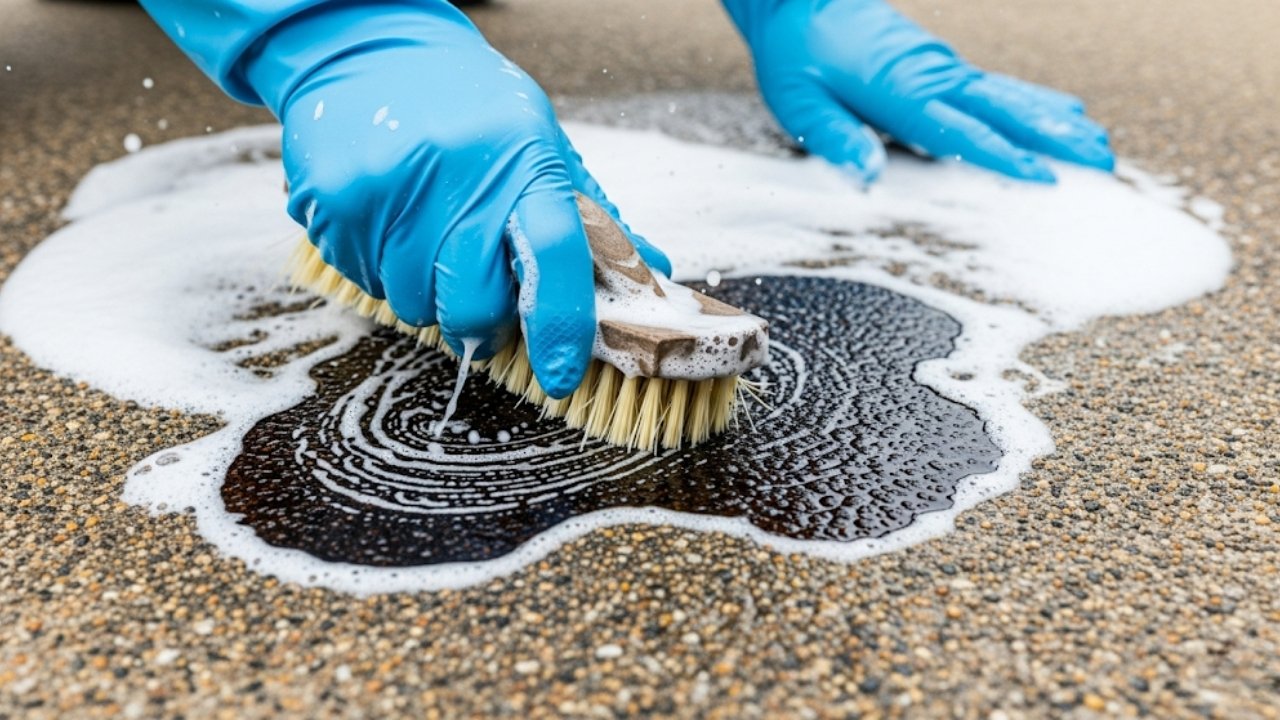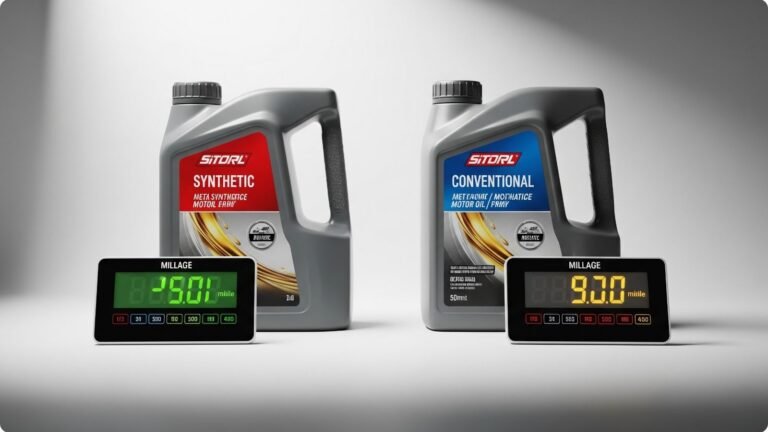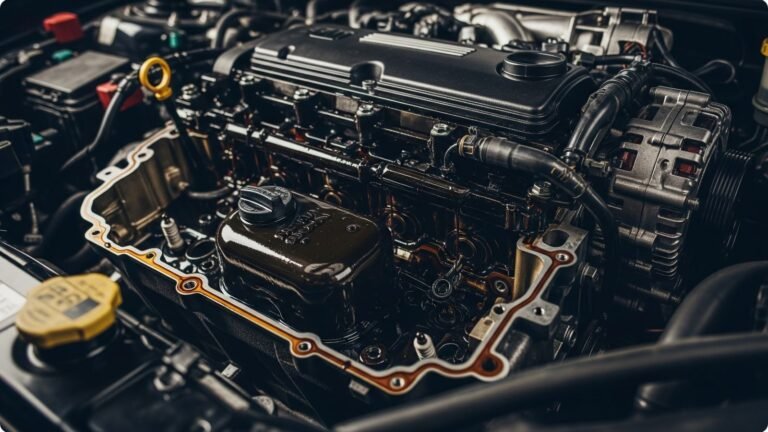How to Get Car Oil Off Concrete Driveway: A Simple Guide

We’ve all been there—walking out to the driveway on a sunny morning, coffee in hand, only to see that dreaded dark patch under the car. It’s not just a stain. It feels like a little betrayal. Your concrete driveway, once bright and clean, now tells the world your car has an oil problem. That blotch can make even the most beautiful home look neglected.
But don’t worry, friend. If you’re wondering how to get car oil off concrete driveway without calling in a pressure washing crew or dropping a small fortune, you’re in the right place. I’ve been through this—more than once. And after a few panicked Googles, several failed attempts, and some solid trial and error, I’ve found what truly works.
This isn’t just a cleanup chore—it’s a little rescue mission. So let’s roll up our sleeves together, shall we?
In This Article
- 1 Why Oil Stains on Concrete Are So Stubborn
- 2 Quick Action vs. Old Stains: Two Different Beasts
- 3 The Tools You Need (Most Are Already in Your Home)
- 4 My Go-To Method for Removing Car Oil from Concrete
- 5 Homemade vs. Store-Bought Solutions: Which is Better?
- 6 How Long Does It Take to Remove the Stain?
- 7 How Weather Affects the Cleaning Process
- 8 When to Call the Pros (And Why It’s Okay)
- 9 Simple Prevention Tricks: Because Stains Aren’t Inevitable
- 10 Cheat Sheet: Step-by-Step Recap to Remove Car Oil from Driveway
- 11 Unusual but Surprisingly Effective Home Remedies
- 12 Frequently Asked Questions
- 12.1 1. Can oil stains be removed completely from concrete?
- 12.2 2. Is pressure washing enough to remove oil from concrete?
- 12.3 3. What’s the best homemade solution for oil on concrete?
- 12.4 4. Will oil stains come out over time on their own?
- 12.5 5. Is it safe to use bleach on oil stains?
- 12.6 6. Should I seal my driveway after cleaning it?
- 12.7 7. Can vinegar remove oil from concrete?
- 12.8 8. How can I tell if my car is leaking oil?
- 13 Final Thoughts: A Clean Driveway Is Worth the Effort
- 14 Final Word
Why Oil Stains on Concrete Are So Stubborn

Concrete isn’t like tile or sealed flooring. It’s porous—think of it like a sponge in disguise. So when car oil drips down, it doesn’t just sit on the surface. It sinks in, seeping deep into the pores. And the longer it stays, the harder it gets to remove.
Here’s what makes it tough:
-
Oil molecules are tiny and slick. They wedge themselves into concrete’s tiny crevices.
-
Heat from the sun bakes them in deeper.
-
Time allows oxidation, turning fresh oil into a sticky, stubborn residue.
That’s why acting fast matters. But don’t stress if the stain’s been sitting there a while—there’s still hope.
Quick Action vs. Old Stains: Two Different Beasts
If you just noticed a fresh spill, you’re lucky. The faster you jump in, the better. But even if the stain’s been there for months, you can still get great results.
Fresh Spill? Here’s What to Do Immediately:
-
Blot, don’t rub. Grab paper towels or even kitty litter and press down to soak up the oil.
-
Contain the spread. Try to avoid walking on it or letting it trail.
-
Apply absorbent. Sprinkle baking soda, corn starch, or kitty litter generously.
Give it a few hours or overnight, then sweep it up. This alone might fix the problem.
But if the oil’s had time to settle in? You’ll need more firepower.
The Tools You Need (Most Are Already in Your Home)
You don’t need to buy fancy cleaners. You probably already have everything needed in your garage or kitchen. Here’s a quick table to help you:
| Item | Use | Best For |
|---|---|---|
| Baking Soda | Absorbs fresh oil | Light, fresh stains |
| Dish Soap (Dawn) | Cuts through grease | Medium stains |
| Degreaser | Breaks down embedded oil | Older, stubborn spots |
| Wire Brush | Scrubs deep into pores | All types of stains |
| Pressure Washer | Rinses residue off surface | After scrubbing |
| Cat Litter (non-clumping) | Absorbs large spills | Fresh leaks |
| Cola or Vinegar | Acid helps break down oil molecules | DIY backup solutions |
These aren’t magic potions—but with the right combo, they work wonders.
My Go-To Method for Removing Car Oil from Concrete
Let me walk you through the exact method I used after my old Toyota decided to leak oil like a faucet.
Step 1: Absorb What You Can
Spread kitty litter or baking soda over the stain. Let it sit overnight. This pulls out a lot of the surface oil. Sweep it up the next morning.
Step 2: Scrub with Dish Soap
Pour a heavy-duty dish soap (like Dawn) right onto the spot. Add a little warm water and start scrubbing with a stiff wire brush. Get aggressive—it’s like brushing your driveway’s teeth.
Step 3: Let It Soak
After scrubbing, let the soap sit for 15-30 minutes. You’re giving the cleaner time to work its way into the pores.
Step 4: Rinse Thoroughly
Use a hose or pressure washer to blast it clean. You’ll often see a noticeable difference already.
Step 5: Use a Degreaser If Needed
Still see a stain? Don’t worry. That’s common with older spills. Pick up a concrete-safe degreaser from your local auto store. Spray it on, let it sit per instructions (usually 15-20 minutes), and repeat the scrub and rinse.
This method worked like a charm for me, especially with a stubborn year-old patch that had become part of my driveway’s personality.
Homemade vs. Store-Bought Solutions: Which is Better?
Sometimes, the old ways work best. Other times, you need the big guns. Here’s a quick rundown to help decide.
Homemade Solutions (baking soda, dish soap, cola):
-
Cheap
-
Usually safe for concrete
-
Great for fresh or mild stains
Commercial Degreasers & Cleaners:
-
Stronger (sometimes industrial-grade)
-
Better for old, deep, or multiple stains
-
Pricier, but faster results
If you’re dealing with years of stains or repeated leaks, a professional degreaser is probably worth the money.
How Long Does It Take to Remove the Stain?
Here’s the thing—removing car oil from concrete isn’t always a one-shot job. It depends on:
-
How old the stain is
-
The weather (hot sun bakes it in)
-
The type of cleaner used
Here’s a rough idea:
| Stain Age | Removal Time Estimate |
|---|---|
| Fresh (under 24 hrs) | 30 mins to 1 hour |
| 1 week old | 1 to 2 cleaning sessions |
| 1+ month | Several rounds, or pro-grade cleaner |
Don’t be discouraged if it takes more than one try. Concrete is tough, but persistence wins.
How Weather Affects the Cleaning Process
Weather plays a big role in how well your cleaning goes. Here’s how to plan around it:
-
Hot, sunny day? Great! Heat helps lift oil and makes cleaners more effective.
-
Cold or rainy day? Not ideal. Oil stiffens, and water dilutes the cleaner.
-
Windy day? Be careful if you’re using a pressure washer. The spray might backfire on you (ask me how I know).
Try cleaning in the morning or late afternoon when it’s not too hot, but still warm enough to loosen the oil.
When to Call the Pros (And Why It’s Okay)
Sometimes, no matter how many times you scrub, the stain just… laughs at you. If:
-
The stain covers a large area
-
It’s been there for years
-
You’re prepping for a house sale
… then call in a professional. It doesn’t mean you’ve failed. Think of it like going to the doctor after trying home remedies.
Simple Prevention Tricks: Because Stains Aren’t Inevitable
Now that we’ve tackled the mess, let’s talk prevention. Because honestly? No one wants to do this more than once.
Here are practical, low-cost ways to protect your concrete driveway from future oil attacks:
-
Use a drip tray: These are flat, absorbent mats you can park over. They catch leaks before they hit the ground.
-
Park on cardboard: Got a car that’s a known leaker? Slip a flattened box under it.
-
Seal your concrete: Sealants create a protective barrier that blocks oil from soaking in. It’s like sunscreen for your driveway.
-
Fix oil leaks: Seems obvious, but it’s often ignored. Even small leaks can cause big stains over time.
You don’t have to be perfect, but taking one or two steps above will save you hours of scrubbing later.
Cheat Sheet: Step-by-Step Recap to Remove Car Oil from Driveway
Sometimes we just need the quick version. Here’s your go-to cheat sheet for removing car oil from concrete driveway:
Step 1: Absorb Oil
-
Apply kitty litter or baking soda
-
Let it sit overnight
-
Sweep it up
Step 2: Scrub with Soap
-
Pour Dawn dish soap directly on stain
-
Add water and scrub with a stiff brush
-
Let it sit for 20–30 mins
Step 3: Rinse Thoroughly
-
Use hose or pressure washer
-
Check results
Step 4: Degrease If Needed
-
Apply concrete-safe degreaser
-
Wait per instructions
-
Scrub again and rinse
Step 5: Repeat as Needed
-
Don’t give up on tough stains
Keep this checklist saved or printed—it’ll come in handy when the next leak appears.
Unusual but Surprisingly Effective Home Remedies
Some methods feel more like folklore than science—but guess what? They often work!
Here are a few bonus tricks that might surprise you:
Coca-Cola
Yep, the soda. Pour a bottle over the stain, let it sit overnight, then scrub and rinse. The phosphoric acid breaks down the oil.
WD-40
Spray a generous amount over the oil stain. Wait 15 minutes. Scrub it out with a brush, then rinse with hot water.
Oven Cleaner
Spray it over the stain. Let it sit for about 10 minutes. Scrub hard and rinse thoroughly. Use gloves and test a small patch first—this stuff’s strong.
Shaving Cream
This one’s bizarre, but foam shaving cream can sometimes lift light stains. Apply, let it sit, and scrub away.
These are hit-or-miss depending on the surface and stain age—but they’re worth trying before buying specialty products.
Frequently Asked Questions
1. Can oil stains be removed completely from concrete?
Yes, but it depends on how old the stain is. Fresh oil is easier to remove. Older, deep-set stains might fade with repeated cleaning but can sometimes leave a faint shadow.
2. Is pressure washing enough to remove oil from concrete?
On its own, no. Pressure washers help rinse out debris and residue but won’t break down oil. You’ll need a degreaser or soap first.
3. What’s the best homemade solution for oil on concrete?
A mix of baking soda, Dawn dish soap, and hot water works well. For stubborn stains, try Coca-Cola or oven cleaner.
4. Will oil stains come out over time on their own?
Unfortunately, no. They can get worse with sun exposure, rain, and dust buildup. It’s best to act quickly.
5. Is it safe to use bleach on oil stains?
Bleach is not effective on oil and may actually discolor your driveway. It’s better for mold or mildew, not grease.
6. Should I seal my driveway after cleaning it?
Absolutely. Once it’s clean, applying a concrete sealer helps protect against future oil penetration and makes cleanup easier.
7. Can vinegar remove oil from concrete?
Vinegar can help with very light stains, but it’s not strong enough for deeper, baked-in oil spots.
8. How can I tell if my car is leaking oil?
Check under the engine for fresh drips after parking. Look for low oil levels on the dipstick. A mechanic can confirm and fix it fast.
Final Thoughts: A Clean Driveway Is Worth the Effort
Let’s be real—getting car oil off a concrete driveway isn’t fun. But once it’s clean, there’s a strange satisfaction that comes with seeing a spotless drive again. It’s not just about appearances. It’s about pride, care, and taking control of your space.
Like a fresh haircut or a clean kitchen, a tidy driveway makes everything feel better.
And now, you’ve got the tools, tricks, and know-how to handle any oil stain that dares to show up. Whether you’re cleaning up a one-time spill or dealing with a chronic dripper, this guide’s got you covered.
Final Word
You don’t need to be a professional cleaner to reclaim your driveway. You just need a few common tools, some patience, and a little elbow grease. Think of it as a weekend project that gives your home a facelift—and gives you the quiet satisfaction of turning a mess into success.
Because honestly? You’ve got this.






